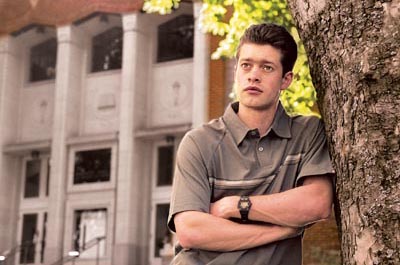 |


|
Summer 2002 | Volume 25, Number 3 | My Response | ||
|
Reflection: 9/11, John 13-17 and Middle-Earth By Nick Glancy '02
I IMAGINE EACH OF US can remember where we were when we first learned of the terrorist attacks on September 11, 2001. I was running along an old country road on Whidbey Island. It was the last day of the cross country training retreat, and also of the Seattle Pacific University faculty retreat, both of which were taking place at Camp Casey. Among the many responses 9/11 triggered in me was an awareness of my functional secularity. Questions that had been theoretical became much more tangible — questions such as: What would I risk my life for? To what extent would I, a Christian, be content to die tomorrow? As I glimpsed the threat of the collapse of political stability and security, I drew comfort from two sources that day. One was joining with the SPU faculty to sing "O God, Our Help in Ages Past." The second was reviewing the words of Jesus in John 13-17, the passage I had been reading on September 10. Among other things, Jesus said: "My peace I give to you," "Let not your hearts be troubled," "I have overcome the world." Now, 10 months later, as I prepare to graduate and am coping with the collapse of another system of stability and security, I find myself resonating again with John 13-17, as well as with J.R.R. Tolkien's The Lord of the Rings. John 13-17 is John's account of the Last Supper. It is the night before the crucifixion, and the fellowship of the thirteen is rapidly drawing to a close. Jesus announces his imminent departure and tells his disciples that he is sending them out into the world. True to form, the disciples are confused, and even when they claim to understand, Jesus seems skeptical. Yet Jesus persists in his plan and prays over them, asking not that they be taken out of the world but that as they enter the world the Father would keep them from the evil one — not necessarily from harm, but from the evil one. As for The Lord of the Rings, the part I most resonate with is the ending. I finished rereading the third book of the trilogy at the end of Winter Quarter, and it was one of my most intense spiritual experiences of the year. I was exhilarated at the triumphant reunion of the characters, and I yearned to join some battle where the outcome really mattered and I was able to make a difference. Yet I simultaneously felt severe heartache as the narrative came to a close. My depression was compounded by the fact that I not only bid farewell to my beloved Frodo, Gandalf and Strider, but also to my friends and roommates who had finished their coursework and were leaving Seattle Pacific a quarter early. Now that I've graduated, I feel that my position parallels both that of the disciples and the fellowship of the ring. I am being sent into the world, and I suspect I will have the opportunity to be significantly more influential in the unfolding drama of God's redemption, a struggle of urgent need and eternal significance. I am committed but confused: I do not know what will come, and I do not understand everything Jesus said. Moreover, my heart is filled with sorrow as the fellowship I have enjoyed while at SPU disperses. Yet the narrative that includes me as a character is, I think, also significantly different from The Lord of the Rings. At our victory celebration, there will be no final fracturing of community. In our Father's house are many rooms. Furthermore, an emphasis in Jesus' prayer is that all of his disciples will be made perfectly one, as Jesus and the Father are one — applying both to the eleven remaining with him and to all who believe through their word, my SPU company included. As we move through our own Middle-Earth, spanning from the appearance of the king to the restoration of the kingdom, and as we struggle to understand and obey what it means to lay down our lives for one another in this present age, we can take comfort. Our Lord has overcome the world; we are guided by the Counselor; and by abiding in Jesus, we are guaranteed a permanent fellowship. In the words of the hymn — as true today as on 9/11 and all preceding history — the God who has been our help in ages past is still our hope for years to come, our guide as long as life shall last, and our eternal home. This essay is adapted from a speech given by 2002 graduate Nick Glancy at this year's Honors Convocation. Glancy, a mathematics and history double major, was one of three winners of the President's Citation, the highest academic award given to a graduating student. He will enter Harvard Law School in 2003.
|
From the President The Board of Trustees adopted a new SPU mission statement in May 2002. "I believe passionately in what we are trying to articulate here," says President Philip Eaton.
Commencement 2002
Baseball: Genesis to Numbers
Tiffany Bricks Project
Varsity Pair Rows to Gold
|
